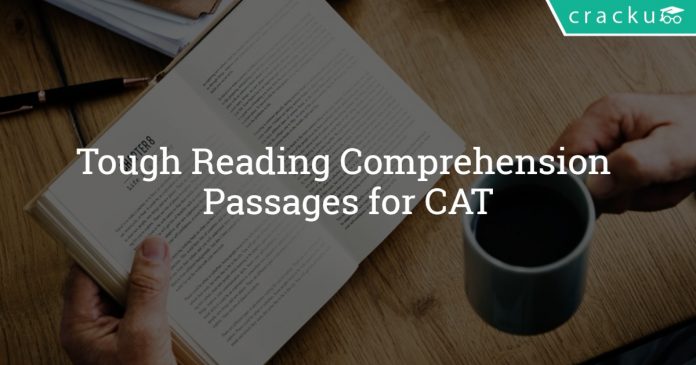Reading Comprehension for CAT PDF consists of a set of Reading Comprehension Passage with questions and Answers. This RC Passages for CAT PDF will be helpful for all other MBA exams also including XAT, IIFT, CMAT, GMAT, GRE, NMAT, TISS etc.,
Tough Reading Comprehension Passages for CAT:
Tough Reading Comprehension Passages for CAT
25 Mocks + 30 Sectionals for Rs. 1400
CAT Data Interpretation Questions PDF
Download CAT Quant Questions PDF
Instructions :
Read the passage carefully and answer the questions that follow:
Without some form of censorship, propaganda in the strict sense of the word is impossible. In order to conduct a propaganda there must be some barrier between the public and the event. Access to the real environment must be limited, before anyone can create a pseudo-environment that he thinks wise or desirable. For while people who have direct access can misconceive what they see, no one else can decide how they shall misconceive it, unless he can decide where they shall look, and at what. The military censorship is the simplest form of barrier, but by no means the most important, because it is known to exist, and is therefore in certain measure agreed to and discounted.
At different times and for different subjects some men impose and other men accept a particular standard of secrecy. The frontier between what is concealed because publication is not, as we say, “compatible with the public interest” fades gradually into what is concealed because it is believed to be none of the public’s business. The notion of what constitutes a person’s private affairs is elastic. Thus the amount of a man’s fortune is considered a private affair, and careful provision is made in the income tax law to keep it as private as possible. The sale of a piece of land is not private, but the price may be. Salaries are generally treated as more private than wages, incomes as more private than inheritances. A person’s credit rating is given only a limited circulation. The profits of big corporations are more public than those of small firms. Certain kinds of conversation, between man and wife, lawyer and client, doctor and patient, priest and communicant, are privileged. Directors’ meetings are generally private. So are many political conferences. Most of what is said at a cabinet meeting, or by an ambassador to the Secretary of State, or at private interviews, or dinner tables, is private. Many people regard the contract between employer and employee as private. There was a time when the affairs of all corporations were held to be as private as a man’s theology is today. There was a time before that when his theology was held to be as public a matter as the color of his eyes. But infectious diseases, on the other hand, were once as private as the processes of a man’s digestion. The history of the notion of privacy would be an entertaining tale. Sometimes the notions violently conflict, as they did when the bolsheviks published the secret treaties, or when Mr. Hughes investigated the life insurance companies, or when somebody’s scandal exudes from the pages of Town Topics to the front pages of Mr. Hearst’s newspapers.
Download CAT 2022 Syllabus PDF
Whether the reasons for privacy are good or bad, the barriers exist. Privacy is insisted upon at all kinds of places in the area of what is called public affairs. It is often very illuminating, therefore, to ask yourself how you got at the facts on which you base your opinion. Who actually saw, heard, felt, counted, named the thing, about which you have an opinion? Was it the man who told you, or the man who told him, or someone still further removed? And how much was he permitted to see? When he informs you that France thinks this and that, what part of France did he watch? How was he able to watch it? Where was he when he watched it? What Frenchmen was he permitted to talk to, what newspapers did he read, and where did they learn what they say? You can ask yourself these questions, but you can rarely answer them. They will remind you, however, of the distance which often separates your public opinion from the event with which it deals. And the reminder is itself a protection.
Question 1:
Which of the following statements is true according to the passage?
a) The decision about what should be public and what should be private about a man’s life is decided by the Government of the country
b) The author is of the view that it is better to not air one’s opinion publicly
c) Some people may think privacy is good, some others may think it is bad, but barriers to information exist for all
d) All transactions related to real estate are kept private in today’s world
Question 2:
What is the main point of the passage?
a) Irrespective of whether it is good or bad, barriers to information exist. Therefore, one should be careful to not take everything at face value
b) The idea of what constitutes a person’s private life is an illusion created by the Government. This is an act of violation of the fundamental rights of the person
c) The notion of what constitutes a person’s or an organization’s privacy is elastic. Irrespective of whether it is good or bad, barriers to information exist in all spheres of life
d) The notion of what constitutes a person’s private life is often intangible. History is replete with such examples
Preparation tips for CAT – Beginners
Question 3:
Which of the following statements about privacy would the author most agree with?
a) A certain aspect of life that has seemingly unrestricted privacy, need not necessarily have such unrestricted privacy in the future
b) It is not a good idea to have privacy in all spheres of public life
c) The affairs of big corporates should not be private
d) It is in the best interests of the citizens of the country that the Government imposes restrictions on privacy
Question 4:
Which of the following is a possible source of the passage?
a) The article is most likely from a research paper on countries and their governments
b) The article is most likely an extract from a book on Public Opinion
c) The article is most likely from a blog post written by an ex-politician
d) The article is most likely from a newspaper editorial
Solutions (1 to 4)
1) Answer (c)
The author gives various examples of spheres of life that are considered private and others that are considered to be public. But, nowhere in the passage does he mention that the decision about what is considered private and what is considered public is decided by the Government. Option a) is incorrect.
The author does not mention anywhere in the passage that it is better to not air one’s opinion publicly. Option b) is incorrect.
Refer to the first sentence of the last paragraph. The author says that reasons for privacy could be good or bad but barriers to information exist. The statement in option c) is therefore true.
Option d) in not correct. It is mentioned in the second paragraph that the sale of a land is not private.
So, option c) is the correct answer.
2) Answer (c)
In the passage, the author is mainly concerned with a couple of points – 1. the notion of what constitutes privacy is elastic and 2. barriers to information exist. He gives various examples to illustrate both the points.
Option c) captures both these main points. Option a) talks about only one of these points. Option b) cannot be inferred. There is no reference to fundamental rights of a person anywhere in the passage. Option d) is also an incomplete summary.
Option c) is therefore the correct answer.
Download Quantitative Ability for CAT
3) Answer (a)
According to the author, the notion of privacy is elastic. So, a sphere of life that is considered to have a lot of privacy may not have such privacy in the future and a sphere of life that is considered to not have much privacy might have a lot of privacy in the future. He gives several examples to make this point. Option a) is correct.
The author only talks about how the notion of privacy is elastic and about how barriers to privacy exist. He does not give his opinion about whether privacy or lack of it in various spheres is good or bad. So, options b), c) and d) cannot be inferred.
4) Answer (b)
The article talks about privacy in the larger context of public opinion. So, it is likely to be from a book on public opinion.
The passage is not about countries and their governments. Option a) can be ruled out.
It is unlikely that a passage of this nature is a blog-post, especially by an ex-politician or from a newspaper editorial. Options c) and d) can be ruled out.
Option b) is the correct answer.
As you have downloaded our Reading Comprehension for CAT PDF, also download our CAT Formulas PDF





![CAT Averages Questions PDF [Important Questions] CAT AVERAGES Questions PDF](https://cracku.in/blog/wp-content/uploads/2022/07/CAT-AVERAGES-Questions-PDF-218x150.png)